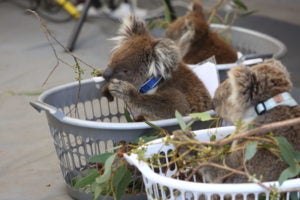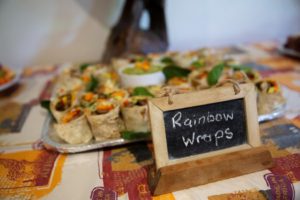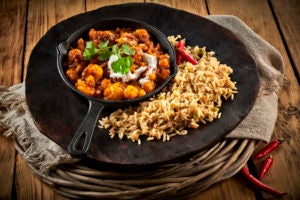
Kangaroo Island, South Australia–As the search-and-rescue mission for wildlife survivors of Australia’s Kangaroo Island bushfires continues, animal charity Humane Society International says the number of animals needing to be taken into care is increasing as starvation and dehydration start to hit.
Humane Society International took the heart-wrenching image of a traumatised koala sitting by the water beside another, deceased, koala. Although some media reports mistook the koala’s hunched posture as mourning, HSI experts say it’s the fact that they’re seeing koalas all over the island curled up and “shut down” like this on the ground instead of in the trees, which indicates a lack of food and water is taking its toll. Animal carcasses, like that of the dead koala in the water, litter the ground across the decimated bushland on the island.
“Sadly, this is the reality on the ground on Kangaroo Island. The survivors have little to no energy reserves left and we are finding them sitting on the ground totally shut down – all too often with other corpses nearby. We did manage to rescue this particular koala and she is doing well in the emergency rehab at the Kangaroo Island Wildlife Park,” said Kelly Donithan, Humane Society International’s disaster response specialist.
Although casualty numbers fluctuate day by day, Kangaroo Island Wildlife Park is also seeing an upturn in wildlife casualties being brought to its emergency triage centre. Although it’s always ideal to leave uninjured surviving koalas high in the trees in their natural habitat, the near total fire damage means that their natural food sources have been turned to ash, and increasing numbers of surviving koalas are now being found on the ground and dehydrated.
Ms Donithan continued: “Over recent days it’s been quite a bit cooler, so perhaps some animals are starting to move more than they did before in a desperate search for food and water, and that’s why we’re seeing an increase. As the days go by, these animals are weakening more and more to a point where they require intervention because there’s virtually nothing left for them out here.”
The Humane Society International team has been building water stations in remote areas where koalas have been seen perching in inaccessibly high trees, and photographs from camera traps set by the charity show that koalas are climbing down to drink. HSI has also delivered building materials to the island to allow for the construction of new temporary shelters at the wildlife park triage centre to help accommodate the growing number of animals needing veterinary and longer term care.
Erica Martin, CEO of HSI/Australia explains: “For so many of these animals, their natural habitat is gone, there simply isn’t anything to sustain them. So although the hope is that in time once the land recovers they will be able to be released back to the wild, that’s not likely to happen for some time yet. So for the meantime, we need to build these little guys a new, temporary home, and thanks to the donations we’re receiving, we’re able to get to work.”
Watch:
Australia Fires: Helping animals in crisis,Australia Fires: Helping koalas in need, Australia Fires: Rescuing animals in need and Facebook Live updates from our rescuers in the field.
Read a recent blog entry by HSUS President & CEO Kitty Block.
Donate to our Animal Rescue Fund at hsi.org/aid.
For more information about our response, see our Australia fires faqs.
Media:
Download photos and video of animal rescue here.
For interviews with HSI’s rescue team on Kangaroo Island, please call
- AU: Rhiannon Cunningham in Sydney on 0406 017 588 or rhiannon@hsi.org.au
- UK: Wendy Higgins in London on +44 (0)7989 972 423 or whiggins@hsi.org
- USA: Nancy Hwa in Washington D.C., on 202-596-0808 (cell) or nhwa@hsi.org


